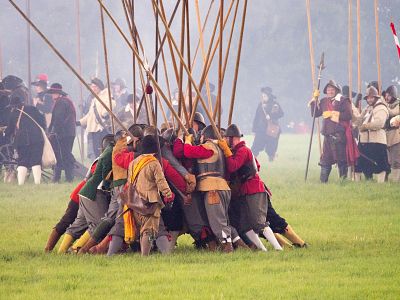On Tuesday 12th June we were pleased to welcome Steve Bird as our speaker, his topic being "Kent in the English Civil War, 1642-1649."
For those unfamiliar with English history, the English Civil War was in fact a series of wars between Parliamentarians (also known as "Roundheads") and Royalists who supported the King (also known as "Cavaliers"). In Kent it was even more complicated with people often fighting for local interests.
Although having a career in HR, Steve explained that his first love had always been military history and he had written a university dissertation on Civil War Kent MP.
Steve started by telling us the surprising fact that casualties in the English Civil Wars were, per capita of the population, much higher than the First World War.
We also learned that at the time of the wars the county of Kent was very different from the rest of the country. Kent's geography, with its bad and often impassable roads, meant that movement and communication were difficult within the county. Although there was a large gentry compared to the rest of the country, the gentry was relatively impoverished; this was because Kentish estates had, for hundreds of years, been split equally amongst all sons instead of just being inherited by the eldest son (as happened elsewhere). Accordingly, resultant estates were small, meaning the gentry had little wealth.
Kent did not "like" the taxes imposed by Parliament, nor did it favour the Puritan religion that Parliament sought to impose. Nevertheless, once Parliament had seized control of the county, three Kentish Regiments fought in the war on the side of Parliament. This led to at least two attempted royalist risings which were bloodily put down.
After winning the first war, Parliament decreed that Christmas was effectively "cancelled"; this led to the so called “Plum Pudding Riots“ – initially in Canterbury. Under the Parliamentary decree shops had been required to close and festivities (including the mass town football match) were forbidden. The local Mayor tried in vain to enforce these new regulations but was beaten with a cudgel by the furious townsfolk when he attempted to intervene.
The Insurrectionists were tried before a Grand Jury; this failed to reach a verdict. Those on trial then presented a petition to Parliament which the local royalists then used to stir up support in Kent.
Parliament denounced the petition as feigned, scandalous and seditious and ordered the Committee of Kent to take action against it. This resulted in the local royalists leading an uprising in which they were joined by diverse groups such as sailors from the fleet, Thames bargemen, and local hooligans.
Steve took us through an exciting account of how Parliament reacted to the uprising, fighting room by room through the streets of Maidstone and forcing the royalists to surrender their weapons outside Canterbury Cathedral.
Another twelve years or so elapsed before Charles the Second landed at Dover and the restoration of the Monarchy was complete. During this time royalists plotted in Kent and the founding of Tunbridge Wells is due in part to the royalists using the spa as cover for their meetings.
Steve's talk was followed by question from Rotarians, one or two of whom had studied history. Finally, Steve was given a warm round of applause.
Picture: A re-enactment of The English Civil War. Picture credit: smallbod from Pixabay.
With many thanks to Alan Mepstead for the initial draft of this article.



